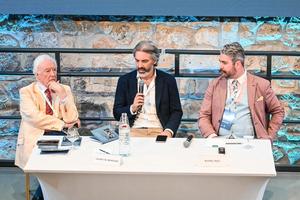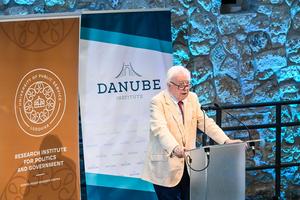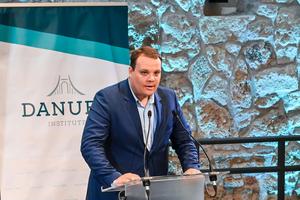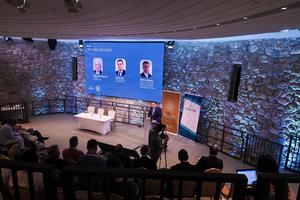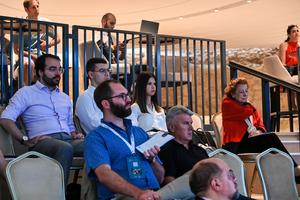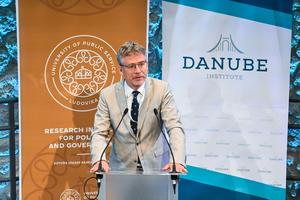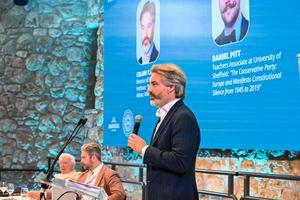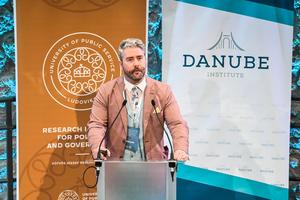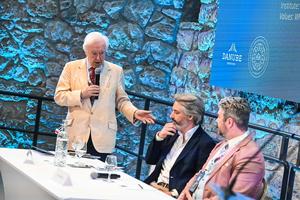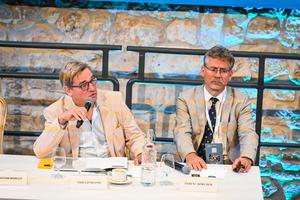Ludovika University of Public Service (LUPS) and the Danube Institute organized a joint scientific conference on British conservatism and the future of Europe on June 18th at the Lónyay-Hatvany Villa conference hall. The event featured distinguished British, European, and American scholars and public figures.
The timing of the event was significant, as 2024 is an election year not only in the United Kingdom and the United States but also for the European Parliament and numerous European member states, including local and European elections in Hungary. In the UK, the right-wing Tory party is expected to lose power, Donald Trump is running again against Joe Biden in the USA, and in Europe, right-wing forces have achieved significant success in the elections.
In the broader context, the Western world is facing a crisis: extreme left-wing movements, including the cultural war initiated by the woke ideology, the migration crisis, and the threat of global nuclear war pose serious challenges. While the left has already presented various scenarios for the future, conservatives have yet to voice their visions for shaping the continent's future.
It can be said that conservative intellectuals are often criticized for nostalgically looking to the past without outlining concrete scenarios for the present and future. The conference on conservative visions for Europe's future provided an opportunity for this discourse.
John O’Sullivan, President of the Danube Institute, in his opening speech, highlighted the significance of freedom of speech and its challenges in the digital age. He emphasized the importance of contextualizing freedom of speech, especially in the areas of liberalism and intellectual property, while acknowledging the dangers of censorship and the varying responses of intellectuals to these dangers. He believes that in the near future, given the revolutionary developments on both sides of the English Channel, the attack on freedom of speech will become much more pronounced. As he put it, we are facing a new world of revolutions.
István Kiss, Executive Director of the Danube Institute, recalled in his speech that this is the third time this conference has been held. The first such event took place two years ago at the Danube Institute, and last year it was organized at Churchill College in Cambridge. In his current speech, the Executive Director highlighted that conservatives should also embrace green policies, as protecting the environment and creating a healthy environment is also a conservative viewpoint.
Ferenc Hörcher, Director of the Institute of Political and Theoretical Studies at Ludovika University of Public Service, in his welcome address, emphasized that the event provides a professional public forum to see how the continental conservative tradition and British conservatism influence each other. "We are now in an election year, on the threshold of an entirely new era, facing all its challenges. Conservative intellectuals and leading conservative politicians need to think about this new era and try to implement a new agenda," emphasized Ferenc Hörcher.
Conservatives often assert that European civilization is in decline and that efforts must be made to preserve European values, cultures, and heritage. But what is the essence of the heritage and culture we should strive to preserve? Calum T. M. Nicholson, Research Director at the Danube Institute, in his presentation, argued that the most fundamental European value is actually the way we see the world and our relationship to it, namely a way of thinking and acting that emphasizes the negative rather than the positive approach. He believes that the roots of this lie in the Christian tradition.
Nicholson sees that most of the great, characteristic achievements of European culture – such as capitalism, democracy, and freedom of speech – place emphasis on the negatives. He believes that Europe is now at risk of losing this negative perspective as it gives way to more positive epistemologies, which provide much less room for self-criticism, thereby losing the dynamism that has long been a hallmark of European culture.
Daniel Pitt, a colleague from the University of Sheffield, presented a typology of British positions on the European question, depending on how conservatives have prioritized and then de-prioritized the relationship between the UK and the EU from 1945 to 2019, up to Brexit.
Speaking about the future of the European right, Phillip Blond, Director of ResPublica, in his presentation, noted that many contemporary opinions see an analogy between current political events and the fall of the Roman Republic and the rise of the Caesars. He sees that in the West, democracy has become disconnected from consensus, and voters are rapidly polarizing.
Francesco Giubilei, President of Nation Futura & Fondazione Tatarella, argued in his presentation why he believes the future of Europe belongs to conservatives. He stated that the European Union has failed in addressing the major challenges of our time, from immigration to foreign policy, environmental policy to protecting our identity. As he put it, we need to create a new European model based on freedom, nation, family, Christian roots, identity, and border protection, which is the Europe of conservatives.
The conference also featured presentations by Sebastian Morello, Senior Editor of the European Conservative, Matt Beech, Director of the British Politics Center at the University of Berkeley, Alvino-Mario Fantini, Editor-in-Chief of the European Conservative, and André P. DeBattista, Associate Professor at the Institute of European Studies at the University of Malta. The scientific discussion was joined online by P. Bracy Bersnak, Acting Chair of the Department of Political Science and Economics at Christendom College, and Ojel L. Rodriguez Burgos, Lecturer at Sacred Heart University.
Text: Éva Harangozó
Photos: Dénes Szilágyi
